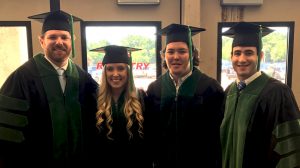
UM engineering graduates who are now medical doctors include, from left, Drs. Brooks Turner at Halifax Medical Center, Jennie Katherine Ellis Lofton at UMMC, Steve Faulks at the University of Florida College of Medicine and Cameron Bonds at North Mississippi Medical Center. Submitted photo
When Dr. Brooks Turner, a 2013 general engineer graduate from Ole Miss, was considering career options, he knew he wanted to go into a field where he could help make a difference in people’s lives. He then made the decision to go into the medical field, which he viewed as a combination of altruism and science, similar to engineering. He is now practicing family medicine at the Halifax Medical Center in Daytona Beach, Florida.
“I believe the critical-thinking skills I acquired in engineering have played a major role in preparing me for the medical field,” Turner said. “The system-based approach to problem solving has definitely helped me in evaluating clinical scenarios.”
Dr. Ellis Lofton, a psychiatrist at the University of Mississippi Medical Center, was a general engineering major at Ole Miss and graduated in 2013. She said she believes there can be a misunderstanding when it comes to general engineers and their career paths.
“I think there is a misconception that you have to major in biology or chemistry to gain acceptance into medical school,” Lofton said. “However, I don’t believe that is the case. While my medical school class did have a significant proportion of students with science backgrounds, we also had students with backgrounds in engineering, architecture, law and seminary.”
Her engineering undergraduate skills, similar to Turner’s, also taught her how to problem solve, which has benefited her medical career.
“I think one of the greatest things I learned in my engineering studies was how to problem solve,” Lofton said. “Now, I use those same problem-solving skills from undergraduate to work with patients and find what therapies and treatments work best.”
The medical field is open to engineers, and Turner said he hopes future undergraduates will take advantage of it.
“I would definitely encourage students to strongly consider engineering as a pathway to medicine,” Turner said. “It’ll prepare you to critically think when problem solving, allow you to tailor your pre-med undergraduate schedule in a way that fits your plans for taking the MCAT and applying for medical school, and it will most certainly help your resume and application stand out.”